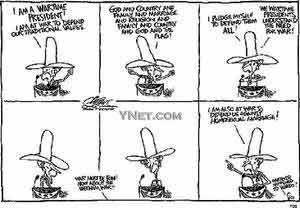| 小布什:我是战时总统 | |
| http://www.sina.com.cn 2004/07/27 10:02 北京青年报 | |
 小布什:“我是战时总统!” The word "war" refers to military activities, but it is also commonly used in a figurative sense. In the 1980s and 1990s many people spoke of "cultural wars" in America. One of these conflicts was over the place of post-modern theory in the English and history departments of US universities; this "war" generated a great deal of noise but was largely ignored by the general population. The other "war" was -- is -- over cultural values and moral norms in the larger society: on one level, how skeptical America should be of its Judeo-Christian European civilization, and on another level, how open it should be to changes in morality. Are Americans right to be alarmed at high divorce rates? Should they be upset because so many men and women live together without getting married? How accepting can society wisely be of homosexuality, of abortion, of drug use? Is the family as a social institution just evolving or declining? Can such a decline be arrested and reversed①? These questions necessarily become political matters in America. The Republican Party in particular has cast itself as the defender of "family values". Democrats are quick to point out that, as they see it, Republican lawmakers have actually been busy undermining the economic foundation of American families. In today's cartoon, Pat Oliphant shows us George Bush on the stump. He wears the big Texas cowboy hat that Oliphant gives him to emphasize what the cartoonist considers his immaturity and dependence on a group of ruthless senior advisors. Bush announces, "I am a wartime president!" A "wartime president" is one who must make the hard decisions connected with armed conflict, in Bush's case, the military actions that are a response to the 9/11 terrorist attacks. In return, such a leader tends to enjoy a large measure of support even from voters who disagree with many of his decisions. Politicians like to be "wartime presidents". Unless, of course, the war is going badly. Oliphant portrays Bush as declaring himself at war... to defend traditional values. Iraq? Let's not focus on the current difficulties there. And also not on the questionable justification for the war, those weapons of mass destruction that somehow have never turned up. And let's not talk about the Vietnam War either, from which the young George Bush so conspicuously absented himself, unlike his opponent, Senator John Kerry. In fact, Oliphant implies, this "wartime president" won't talk about military wars at all, just the cultural ones, thank you②.(听英文53580,文章注释535801) | |
| 小布什:“我是战时总统!”(图) | |
“战争”一词是指军事上的行动,但也常常用作一种比喻。上个世纪80年代和90年代,很多人都说到美国的“文化战争”,冲突的焦点之一是后现代主义理论在美国大学英语系与历史系中的地位,这场“战争”曾喧嚣一时,但一般公众对此未加理会。另一场“战争”从那时延续到现在,是在社会的更大范围内有关文化价值及道德规范的争论:对于其以犹太教和基督教为基础的欧洲文明,美国应持怎样的批判态度,这是一个层面;而在另一个层面,美国人应如何接纳道德上的变化,美国人为离婚率高而不安有道理吗?美国人是否要为很多人未婚同居而感到苦恼?社会如何明智地接受同性恋、堕胎和吸毒?作为社会基本结构的家庭是在进化还是在衰退?如果说是衰退的话,那么这种衰退能否被制止并且逆转? 这些问题必然成为美国的政治问题,而共和党更是将自己塑造为“家庭价值”的捍卫者,民主党则根据自己的分析立即指出,共和党的立法者实际上是在忙于破坏美国家庭的经济基础。 在今天的漫画中,漫画家帕特·奥列芬特所画的布什总统正在做巡回政治演说,他头戴一顶大大的得州牛仔帽。奥列芬特这样画是想强调他眼中的布什是不成熟的,而且依赖那些缺乏同情心的高层幕僚。布什宣称“我是战时总统!”“战时总统”是必须做出与军事冲突相关的艰难决定的总统,对于布什来说,军事行动就是对9·11恐怖分子的袭击做出回应。反过来,这样的总统往往能从哪怕是反对他所做的其他决定的选民中获得很大支持。政治家们都愿意当一名“战时总统”。 当然了,除非是战争进行得很不顺利。 奥列芬特描绘了布什宣布自己正处于捍卫……传统价值观的战争中。而伊拉克战局呢?请不要把眼光集中在眼下那里的困难,也不要集中在这场战争令人怀疑的正当性上,那些大规模杀伤性武器不知怎的从来就没露过面。也请不要谈越南战争,因为当年年轻的布什显然没有参战,这与竞选对手参议员克里可不一样。实际上,奥列芬特的意思是这位“战时总统”根本不想谈军事战争,只是想谈文化“战争”,其余的您就少说为妙!
|
| 【英语学习论坛】【评论】【大 中 小】【打印】【关闭】 |